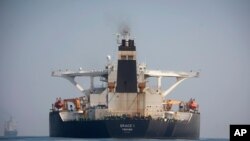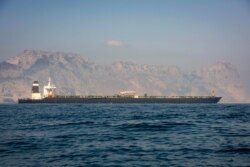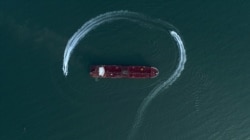Updated Aug. 16, 5:50 a.m.
VOA Persian's Katherine Ahn contributed to this report.
The Supreme Court of theBritish overseas territory of Gibraltar ruled Thursday that the Iranian supertanker Grace 1 can be released from detention, shortly after the United States launched a new, last-minute legal bid to hold it.
Gibraltar's government said it had received assurances from Tehran that it would not send the crude oil cargo to Syria. Gibraltar did not immediately say, however, when or if the ship would set sail. The Reuters news agency quotes Iran as saying the ship will be reflagged and renamed and will sail as soon as it can refuel and be made ready.
Gibraltar chief minister Fabian Picardo said in a statement: "We have deprived the Assad regime in Syria of more than $140 million worth of crude oil."
The Grace 1 had been carrying 2.1 million barrels of Iranian oil when Gibraltar police and British Special Forces seized it. It was one of a series of recent incidents in which Western nations and Iran targeted each other, with most occurring in the Persian Gulf or at other spots in the Mideast.
Iran reaction
After seizure of the Grace 1, Tehran retaliated by taking control of a British tanker, the Stena Impero, on July 19 in the strategic Strait of Hormuz — the shipping lane for about a fifth of the world’s crude — for breaking “international maritime rules.” Iran still holds the Stena Impero.
Iran had repeatedly called for the release of the Grace 1, saying it had been international waters and was not headed to Syria.
Tehran condemned Thursday’s U.S. bid to block the release of the ship.
Iranian Foreign Minister Mohammad Javad Zarif said on Twitter, “Having failed to accomplish its objectives through its #EconomicTerrorism — including depriving cancer patients of medicine — the U.S. attempted to abuse the legal system to steal our property on the high seas. This piracy attempt is indicative of Trump admin’s contempt for the law.”
In a Thursday interview with VOA Persian, Brookings Institution foreign policy research director Michael O’Hanlon said he did not see Gibraltar’s decision on the tanker as a significant failure for U.S. policy.
“I think this is in the category of ‘win a few, lose a few.’ We decided to make a run at (the tanker). Apparently we have been unsuccessful,” O’Hanlon said. “It doesn’t change the overall situation, which is that we are squeezing Iran harder and harder economically. They are getting less and less oil out, even as they get some sanctions evasion and avoidance. You don’t have to necessarily win every single engagement of this type for the overall strategy to succeed,” he added.
U.S., Iran tensions
The dispute over the tanker is part of the ongoing confrontation between U.S. President Donald Trump and the Iranian government over its nuclear program, ballistic missile development and involvement in regional conflicts. The confrontation escalated last year when Trump withdrew the U.S. from a 2015 international agreement in which Iran agreed to curb activities that could be diverted to making nuclear weapons in exchange for relief from crippling economic sanctions.
Trump said the 2015 deal did not do enough to prevent Iran from developing nuclear weapons or engaging in other perceived malign behaviors. By withdrawing from it, he unilaterally re-imposed U.S. sanctions against Iran, hobbling its economy in a so-far unsuccessful effort to force Iran to negotiate a new deal. Trump has said such a deal should cover not just Iran’s nuclear program but also its activities related to ballistic missiles and support for Islamist militant groups hostile toward the U.S. and U.S. allies.














